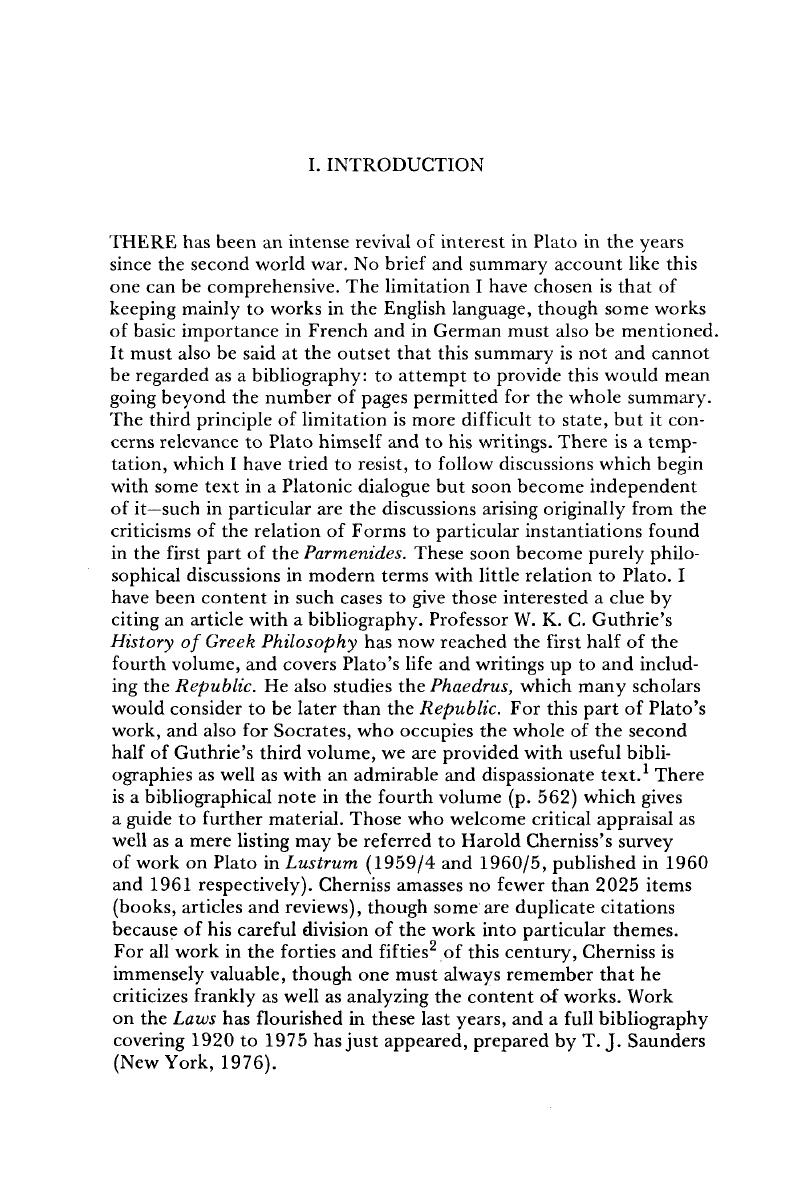No CrossRef data available.
Article contents
I. Introduction
Published online by Cambridge University Press: 05 February 2016
Abstract

- Type
- Introduction
- Information
- Copyright
- Copyright © The Classical Association 1976
References
Notes
1. I reviewed the third volume in JHS 91 (1971), 175–86, the later pages covering the portion on Socrates. Professor Gregory Vlastos reviewed the fourth volume in the TLS, 12.12.75. Other reviews will, no doubt, follow.
2. Cherniss’s official limits are 1950–7, but he frequently quotes earlier work and includes some items as late as 1959.
3. Plato (London and New York, 1972). Vol. 1: Metaphysics and Epistemology; vol. 2: Ethics, Politics, and Philosophy of Art and Religion. The Philosophy of Socrates (London and New York, 1972)Google Scholar.
4. One should distinguish from all these collections Platonic Studies (Princeton, 1973), in which Vlastos collects his own work. Another important collection is Studies in Plato ’s Metaphysics edited by Allen, R. E. (London, 1965)Google Scholar.
5. Crombie has also produced a simpler form of his book: Plato, , the Midwife’s Apprentice (London, 1964)Google Scholar.
6. Vries’s, G. J. de edition of the Phaedrus (Amsterdam, 1969)Google Scholar is written in English, and is valuable, but perhaps at a rather ‘sixth-form’ level. It has great strength on the literary and philological side. Other smaller editions are Bluck, R. S., Letters 7 and 8 (Cambridge, 1947)Google Scholar; Allan, D.J., Republic 1 (London, 1953)Google Scholar; and Ferguson, John, Republic 10 (London, 1957)Google Scholar on a similar scale.
7. It is similar in purpose (but on a smaller scale) to Kittel’s Handwörterbuch zum Neuen Testament. But this can be held in the hand—Kittel cannot!
8. Two short works on Plato not mentioned among the general books previously named are Bluck, R. S., Plato ’s Life and Thought (London, 1949)Google Scholar (it contains a translation of the seventh Letter); and Field, G. C., The Philosophy of Plato (Oxford, 1949 Google Scholar; paperback 1969). Both provide admirable introductions. Field’s Plato and his Contemporaries (London, 1930) was reprinted in 1948. Havelock’s, E. A. A Preface to Plato (Oxford, 1963)Google Scholar asserts a contrast between an oral, unreflective culture based on the poets, and a literate, ‘numerate’ and reflective state of mind represented by Plato—a contrast which he overstates. (See Gulley’s, Norman review in CR N.S. 14 (1964), 31–3.Google Scholar) Brumbaugh, R. S., Plato for the Modern Age (New York, 1962)Google Scholar offers a more reliable general introduction.


